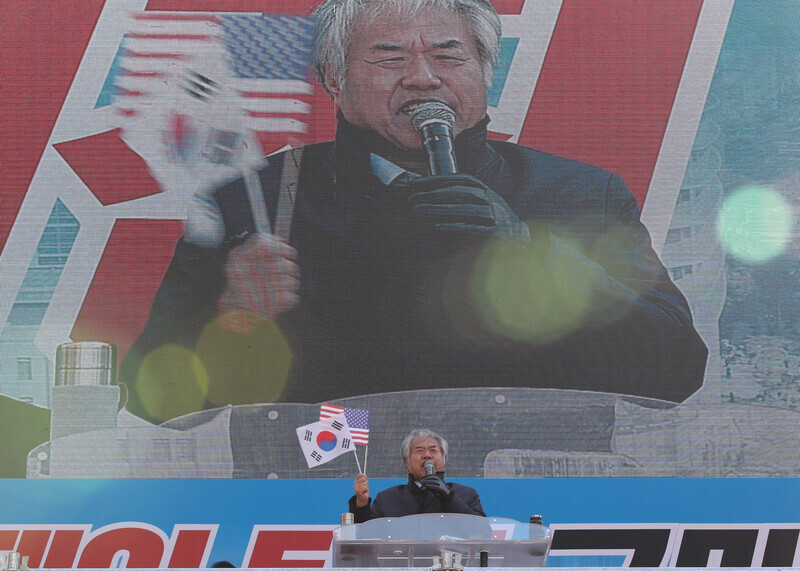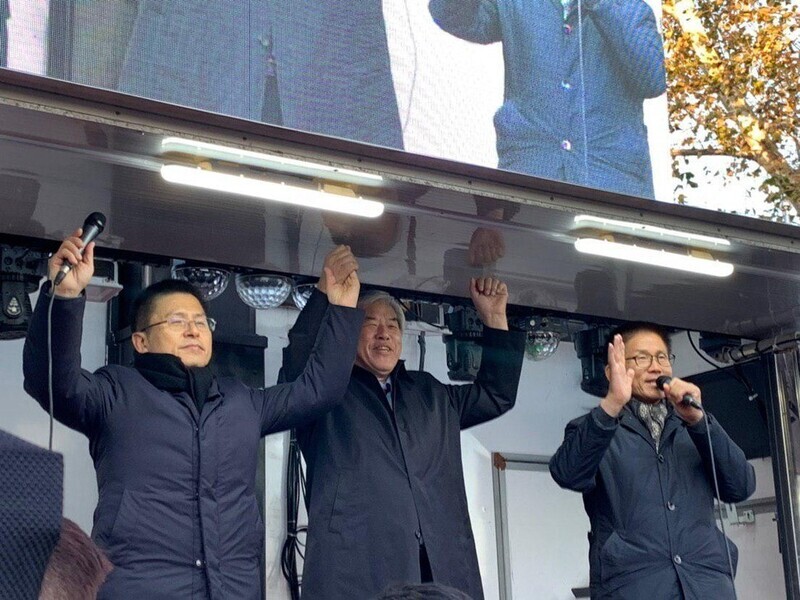hankyoreh
Links to other country sites 다른 나라 사이트 링크
[News analysis] The rise of Jun Kwang-hoon from pastor to political player

Controversial Korean pastor Jun Kwang-hoon recently resigned as the president of the Christian Council of Korea (CCK), raising questions about how he ever became a leader of Korea’s Protestant community in the first place. Today, the CCK is only a shadow of its former self, but for four decades, it was one of the leading groups of conservative Protestants in Korea.
Jun is known for making statements that sound outrageous coming out of the mouth of a Christian. Back in 2006, he said that a true believer would “take their underwear off” if he asked them to; just last year, he said that God would be “done for” if he “got cheeky” with Jun.
Jun is also a dreamer who longs for an organization that could control churches as the Vatican did back in the Middle Ages. He is a political operator who has set up a Christian party in all four general elections since 2008, changing the party’s name every time. Nevertheless, he was elected chairman of the CCK, fueling critics who say that conservative Protestants and Jun are on the same team.
Such criticism is reinforced by Jun’s explanation of why he established the Party for Practicing Christian Love in 2008. “Even though I don’t know anything but the ministry, senior ministers like Cho Yong-gi and Kim Joon-gon said that Jang Gyeong-dong and I should set up a Christian political party to fix our country,” Jun said.
In effect, Jun was chosen to be the standard bearer of the Protestant community by far-right ministers at some of Korea’s largest churches. Cho Yong-gi, also known as David Cho, is the founder of Yoido Full Gospel Church, while Kim Joon-gon is founder of Korea Campus Crusade for Christ.
Protestant missionaries started out in Joseon as leaders in education and charityProtestant missionaries and ministers took the lead in education and in charitable projects at the end of the Joseon Dynasty and during Japan’s colonial rule over Korea. Even after Korea’s liberation, many of them “took up the cross,” enduring considerable hardships as they stood on the front lines of social movements, calling for democratization, human rights, and better treatment for workers, farmers, and the poor. But on the other side, there were pastors on the far right who nursed personal grudges to turn a religion of love into one of hatred, prevented the reconciliation of the Korean nation, and mobilized churches and churchgoers for their own personal ambition and greed.

Christians persecuted by communists join conservative coalition with military dictatorship
Ministers have been taking part in political parties since shortly after Korea’s liberation. Youngnak Presbyterian Church, one of the wellsprings of conservatism in the Korean Christian church, was founded by Han Kyung-chik, who set up the Christian Social Democratic Party in September 1945, while serving as pastor of the Sinuiju Second Church, in present-day North Korea. After North Korean pastors and elders were purged and their churches and assets confiscated by the communists, Han made his way to the South.
Christians who had fled the North and despised the communists formed a triple alliance with the US, the source of Christianity in Korea, and with then President Syngman Rhee, who wanted to turn South Korea into a Christian state. The North Korean Christians and Rhee shared a far-right ideology that was anti-communist and pro-American.
The North Korean Christians at Youngnak Presbyterian Church spearheaded the establishment, in 1947, of the Northwest Youth League, a paramilitary group that played an instrumental role in propping up Rhee’s dictatorship. The league is known for breaking up the Special Investigation Committee of Anti-National Activities, assassinating independence activists, and massacring ordinary people that were perceived as communists. Such actions made Protestants the primary beneficiaries of government auctions of Japanese property confiscated after the colonial occupation; Protestants also served as the prime conduit for US aid that flowed into Korea after the Korean War.
Conservative churches that flourished through their opposition against the communists, support for the Americans, and coziness with the dictatorship also served as the vanguard in the military dictatorship of former President Park Chung-hee. Jeong Gyeong-il, director of the New Path Christian Center for Society and Culture, provided the following explanation: “Anyone who visited a religious facility in the army in the 1970s would have seen two of Park Chung-hee’s slogans hanging on the walls: ‘putting faith to military use’ and ‘converting the entire army to the faith.’ Park’s Yushin regime sought to turn faith into fighting power, and in exchange for serving that purpose, churches wanted to convert all the soldiers. Political forces and the church pursued mutual growth.”
“Because the military dictatorship was anti-communist, [conservative pastors] didn’t have to take to the streets. We didn’t see right wing protesters waving Korean and American flags until the Kim Dae-jung administration, when the inter-Korean summit brought the mood of peace to the Korean Peninsula. These actions by fundamentalist churches are designed to reinforce internal unity by inciting hostility and hatred for external enemies since growth has been slowing at Protestant churches and their social influence waning since the 1990s,” Jeong said.
Churches start forming their own political partiesConservative pastors of large churches such as Cho Yong-gi and Kim Jun-gon established the Korean Christian Party shortly before the legislative elections in 2004. That was on the heels of the election of Roh Moo-hyun, Korea’s second progressive president in a row, after Kim Dae-jung. The political parties formed by Jun Kwang-hoon and other such pastors have always failed to clear the 3% hurdle that would allow them to enter Korea’s National Assembly.
Even so, those pastors have kept trying to expand their political influence, such as by ordering churches to “mobilize the troops” to elect Lee Myung-bak in 2008; Lee became the first Christian elder to become the president of South Korea. The Korean Alliance of Elders, representing elders at large churches who have followed the lead of their conservative pastors, helped mobilize protesters for a major rally on Aug. 15 in Seoul’s Gwanghwamun Square, which contributed to a nationwide resurgence of COVID-19. In short, Jun arose from the far-right pastors at big churches who have meddled in politics to defend the vested interests of the church by maintaining the division of the Korean Peninsula.
“These groups’ strategy of hating three groups — communists, Muslims, and homosexuals — is similar to the techniques of the Nazis, who incited hatred with their fervent pan-Germanism, anti-communism, anti-Semitism, and discrimination against minorities,” said Hwang Yeong-ik, former member of the Church 2.0 Ministers Movement Action Committee.
“Jun Kwang-hoon and other far-right pastors aren’t likely to give up their twisted desires,” said Lee Jeong-bae, a pastor and former chair of the Council of Christian Professors. Lee expects that far-right churches will regroup and reconnect with Jun after the COVID-19 crisis is over.
But Kim Gyeong-jae, a pastor and former director of the Christian Academy, takes a different view. “Conservative churches are shackled to the counter-enlightenment idea of Biblical inerrancy, as well as anti-scientism, corrupt capitalism, and anti-communism dating back to the Cold War, which has kept them from adapting to historical changes in the global community. Religious projects of the kind advanced by Jun Kwang-hoon aren’t going to fly with people born in the 1970s and afterward.”
By Cho Hyun, religion correspondent
Please direct comments or questions to [engish@hani.co.kr]

Editorial・opinion
![[Column] Season 2 of special prosecutor probe may be coming to Korea soon [Column] Season 2 of special prosecutor probe may be coming to Korea soon](https://flexible.img.hani.co.kr/flexible/normal/500/300/imgdb/original/2024/0426/3317141030699447.jpg) [Column] Season 2 of special prosecutor probe may be coming to Korea soon
[Column] Season 2 of special prosecutor probe may be coming to Korea soon![[Column] Park Geun-hye déjà vu in Yoon Suk-yeol [Column] Park Geun-hye déjà vu in Yoon Suk-yeol](https://flexible.img.hani.co.kr/flexible/normal/500/300/imgdb/original/2024/0424/651713945113788.jpg) [Column] Park Geun-hye déjà vu in Yoon Suk-yeol
[Column] Park Geun-hye déjà vu in Yoon Suk-yeol- [Editorial] New weight of N. Korea’s nuclear threats makes dialogue all the more urgent
- [Guest essay] The real reason Korea’s new right wants to dub Rhee a founding father
- [Column] ‘Choson’: Is it time we start referring to N. Korea in its own terms?
- [Editorial] Japan’s rewriting of history with Korea has gone too far
- [Column] The president’s questionable capacity for dialogue
- [Column] Are chaebol firms just pizza pies for families to divvy up as they please?
- [Column] Has Korea, too, crossed the Rubicon on China?
- [Correspondent’s column] In Japan’s alliance with US, echoes of its past alliances with UK
Most viewed articles
- 1‘We must say no’: Seoul defense chief on Korean, USFK involvement in hypothetical Taiwan crisis
- 2AI is catching up with humans at a ‘shocking’ rate
- 3[Column] Season 2 of special prosecutor probe may be coming to Korea soon
- 4Division commander ordered troops to enter raging flood waters before Marine died, survivor says
- 5Korea sees more deaths than births for 52nd consecutive month in February
- 6Is Japan about to snatch control of Line messenger from Korea’s Naver?
- 7[Guest essay] The real reason Korea’s new right wants to dub Rhee a founding father
- 8[Editorial] Korea’s surprise Q1 growth requires objective assessment, not blind fanfare
- 9Is N. Korea threatening to test nukes in response to possible new US-led sanctions body?
- 10One Hyundai worker suffers through 16 piecemeal contracts in 23 months